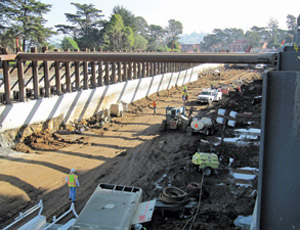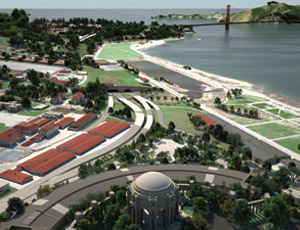Despite recent heavy opposition, including a court-ordered temporary restraining order, California’s Dept. of Transportation and the San Francisco County Transportation Authority have awarded a public-private partnership contract to their selected bidder for the second phase of the $1-billion Doyle Drive replacement project, known as Presidio Parkway, in San Francisco.


Caltrans announced the agreement on Jan. 3, just hours after an Alameda County Superior Court judge dissolved the restraining order the court granted on Dec. 22 to the state engineers union, Professional Engineers in California Government. But Judge Wynne Carvill says he will announce a request for a preliminary injunction and hearing on the project’s merits at a later date.
The two-phase Presidio Parkway project began in 2009. The first phase is scheduled for completion later this year. Work includes four contracts covering relocation of historic buildings, construction of a 1,400-ft-long southbound viaduct as high as 115 ft, a southbound 853-ft-long cut-and-cover tunnel, environmental mitigation and utility location. Construction on the second phase would begin in late 2011 and continue through early 2015. It involves building the new northbound partner viaduct and northern tunnel, a pair of 1,017-ft-long tunnels, an interchange and landscaping.
In November, California, Caltrans and the San Francisco County Transportation Authority issued a notice of intent to award a 30-year concessionaire contract worth $488 million for the second phase to a consortium led by Essen, Germany-based Hochtief Concessions for design, construction, finance, operation and maintenance. The other Golden Link Concessionaire LLC partner is Luxembourg-based Meridiam Infrastructure. The construction team is led by Hochtief’s subsidiary, Longmont, Colo.-based Flatiron Construction Corp.
A December report issued by the Legislative Analyst’s Office concluded the project is “not a good fit” for a P3. The LAO previously had recommended the state use P3 approaches for transportation projects on a pilot basis.
“However, as we advised the Legislature during spring 2010 budget hearings, we do not think the Presidio project is a good fit for a P3 procurement approach because the project is already very far along in its schedule and it does not rely on a toll or user fee to fund the work,” states the report, requested by state Senator Alan Lowenthal (D-Long Beach).
“Given the lack of benefits of procuring this particular project under a P3 approach, the state should consider not signing the contract,” adds the report. “If the P3 agreement were not signed, the state could still complete the Presidio project on schedule using traditional pay-as-you-go funding.”
Paul Meyer, executive director of the American Council of Engineering Companies—California, contends the report actually contains positive conclusions about P3s. The project saves the state millions of dollars in up-front costs, he says, freeing up transportation funds for other needed projects.
“It also shifts substantial liability from the state to a private entity, which is contractually responsible to promptly design and build the project,” Meyer adds.
Meyer also says the agreement gives the concessionaire the flexibility to solve construction problems quickly. “Here, the LAO is rightly contrasting this P3 with Caltrans’ normal non-P3 system for delivering transportation projects, a system in which resolving construction problems can be a time-consuming, bureaucratic process,” he says.


Post a comment to this article
Report Abusive Comment